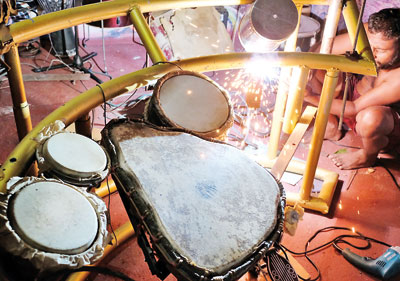Arts
Ghosha: Breaking free with the sound of humanity
We walk into the Shalika Hall late morning to come across a circle of people in animated discourse. Hands thrown about in dramatic illustration of points, voices raised excitedly in debate and laughter, and we sense a strongly palpable fervour that speaks of bubbling artistic ferment.
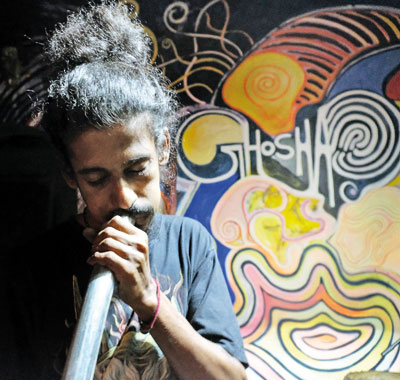
Bakeriye Kattiya: Making music on a different plane (above) and making their own instruments (top right). Pix by Amila Gamage
Here we are very close to the beating heart of Sri Lanka’s Bohemia. Nearly everyone sports Rastafarian hair or torn jeans; but a genuine ardour for art and humanity permeating the conversation as well as the whole atmosphere, tells us they are far from being just dressed to appear maverick or provoke a reaction.
This group is called the Bakeriye Kattiya (the group at the bakery) because their headquarters, where they regularly hold rendezvous, is an old bakery in Horana. Their journey began twelve years back. Chinthaka Geethadeva (Geetha), in search of some hazy dream with no defined edges, was making a living as an itinerant singer, taking the road from Kandy to the hills; Nuwara Eliya, Badulla or what took his fancy. His vagabond existence ceased when he met Hasitha Udayanga or ‘Shaggy’, a soul mate in whose visions and dreams Chinthaka found reflected something he was searching for.
Together they formed the band which was later to be named Ghosha. Their experimenting was to attract other free-spirited young people who, though not part of Ghosha, became the larger group, Bakeriye Kattiya; artists into nearly every form of art you can think of: photography, film, drama, installation art, and writers of poetry, short stories and novels, all aiming to dismantle the boundaries which they found restricting the free growth of their chosen art.
The small nucleus of Ghosha was essentially born out of a sense of disaffection with mainstream music, which Shaggy and Geetha found limiting and uniform across many cultures and countries; “basic, pretty sounds to lull listeners; people hear it, but hardly ever listen.”
“But real music has much greater potential- to develop humans, make them think, transform them and take them to different planes,” Geetha says.
In order to learn to strike these right chords, Ghosha delved into the scientific aspect- of how sounds influence the brain, the circulation of blood, etc., and forayed into all genres that would yield something promising: reggae, rock, metal, blues, jazz as well as trans and psychedelic music. What they found, they infused with Sri Lankan folk music to come up with their own singular style.
Part of their rebellion are the instruments that Shaggy fashions himself: improvised drums and wind instruments as well as violins from kettles and bedpans. These transcend the traditional sounds of instruments made to standards, tapping into an unexplored realm.
Kalagotti, Ghosa’s upcoming concert, is a culmination of their essays to reach out for the full potential of music. It is not a concert strung together by songs each of a couple of minutes- which will not have that transformative magic. It is more enveloping, with the music interwoven with a whole new dimension in the form of young Janith Weerasinha’s doodles.
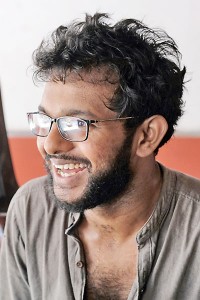
Janith
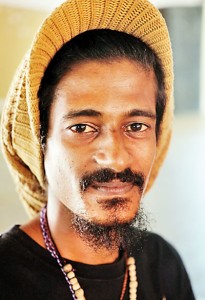
Shaggy.

Chinthaka
Janith, a final year film student at Sri Palee Campus, Horana, is the talented protégé whom Shaggy and Geetha discovered aimlessly wandering among theatre groups.
They were struck by Janith’s genius. What Janith refers to as ‘doodles’ is beautiful visionary art. Unravelling through pages of old handed-down diaries, which are the sole repositories of his work, they are quite an experience. They fascinate you with their landscapes of human feelings, incredibly flowing off the nibs of 20 Rupee ballpoint pens.
In self-deprecating humour Janith calls his work “kaputu (crow) art”, but it would be wrong to read bitterness into this. True- Janith admits he found, long ago, that people care very little- if at all- for art, and true that his maverick stance has made him something of an outcast (he remembers being chased out of art classes for his work), but for all that he retains an innate concern for humanity- which is part of what animates him.
Art for him is his ‘thumb’, he says; an indispensable part of his life. He believes art is a basic human element, in that everyone can draw- and indeed does draw at some point or other in life. Art, and any kind of self-expression like poetry, he says, brings discipline and control to the individual. And it can heal.
Whenever he approaches a crisis in life, his antidote is to resort to the diary. The doodles become a process of interaction with his mind, which ultimately soothes him . ‘I really don’t know what my art may do to other people,’ he says. ‘But I do know that it has liveliness and that that liveliness comes from honesty of expression.’
‘I firmly believe that honesty is essential to a human being. Not only to do art but for anything in life.’
How does Janith’s art complement the music in Kalagotti? The young artist explains that his works are often born simultaneously and in rhythm with the music of the band, and this art will be displayed on a circular video wall in tandem with the live music. The idea is for the visual panorama to gently tire the eyes. Once the audiences close their eyes, the music will still continue to keep the mind alive. As one sense grows weary the other takes over in a gentle, natural wave. Through this harmonious amalgam of the visual and the aural they seek to trigger a change for the better in us as individuals.
In a world where man is losing touch with nature and humanity, Janith believes it is the vocation of art to ease him back into place. ‘In the modern technological age humanity moves forward very fast. But due to that speed man has lost himself. Man should not lose his human qualities in the onrush of technology. Art should reintroduce or remind of those qualities to man.’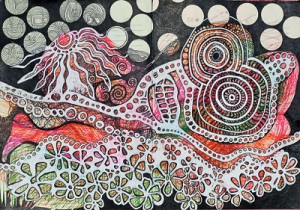
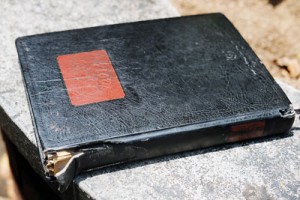
Janith’s diary of doodles and one of his creations (right)
Having talked to them, it strikes me that Bakeriye Kattiya, Ghosha and Janith are not really ‘bohemians’- a word that makes you think of superior beings who have nothing but disdain for those who they deem ‘conventional’. In vivid contrast there is something very human and compassionate here- also etched into the final words of Janith, which speak for the others as well: ‘what we ultimately need is not to make brilliant art or music; we want to share things; for humanity as a whole to progress together. That is why Geetha and Shaggy let me in; otherwise they would just have done their music; enjoyed that and gone ahead with that, instead of fostering and guiding me. And I, too, in my stead, have to leave something behind.’
Be there at the Shalika Hall, Colombo 5, by 7 p.m. on May 18 to experience Kalagotti. A ticket is priced at Rs. 500 for an evening of transformative acoustics and art.
